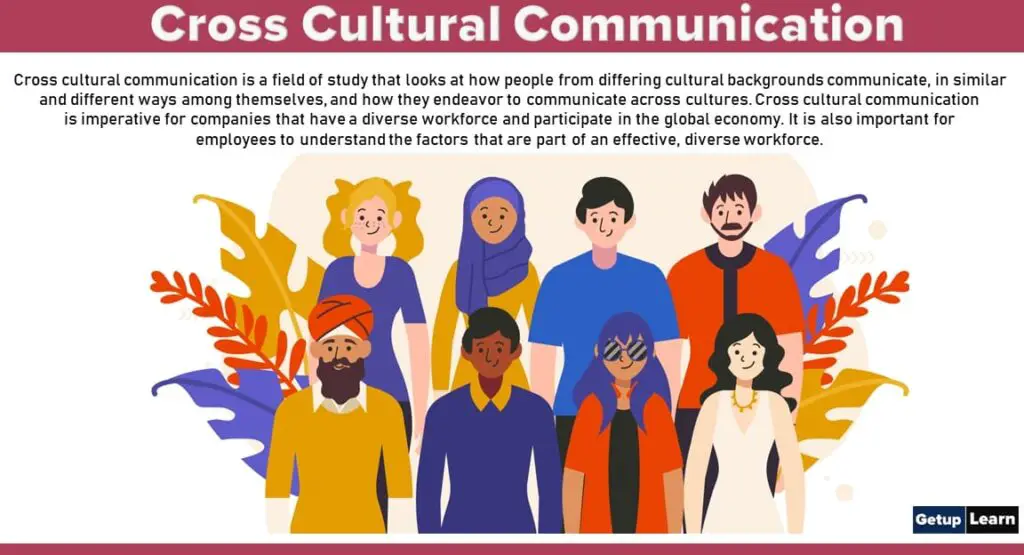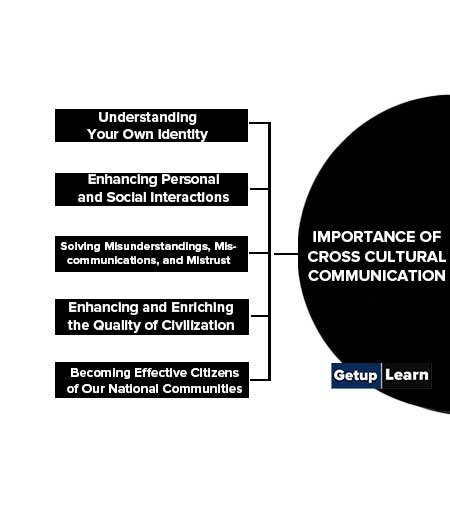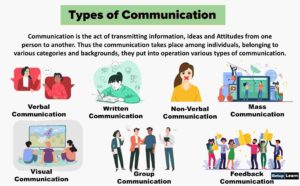Table of Contents
What is Cross Cultural Communication?
Cross cultural communication is a field of study that looks at how people from differing cultural backgrounds communicate, in similar and different ways among themselves, and how they endeavor to communicate across cultures.
Cross cultural communication is imperative for companies that have a diverse workforce and participate in the global economy. It is also important for employees to understand the factors that are part of an effective, diverse workforce.

Culture is something that human beings learn and as a result, learning requires communication and communication is a way of coding and decoding language as well as symbols used in that language.
For example, humans communicate through any means other than language such as facial expressions, gestures, body language, posture, etc.
International Communication
International communication is a global form of personal or national communication. There is a difference in the style of thinking, acting, and behavior of people belonging to different cultural backgrounds. The deep feeling of the people of a country toward their culture is known as Cultural Sensitiveness‘.
The first step in learning to communicate with people from other cultures is to become aware of what culture means. Actually, sometimes it becomes the root cause of international differences which function as a barrier to international communication.
Culture is a way of life of a group of people the stereotyped patterns of learning behavior, which are handed down from one generation to the next through means of language and imitation.
The increasing use of information technology has made the world a global village where the people of various countries need to communicate with each other. Now, communication is not considered just a regional or national concept rather it has assumed an international form.
Cultural sensitiveness depends on the values, beliefs, and practices of different persons. Cultural sensitiveness affects our response to people and situations. It is just an extension of personal or national communication. The main difference between the two is associated with the difference between the cultures of the countries involved in communication with each other.
Importance of Cross Cultural Communication
These are the importance of cross cultural communication:
- Understanding Your Own Identity
- Enhancing Personal and Social Interactions
- Solving Misunderstandings, Miscommunications, and Mistrust
- Enhancing and Enriching the Quality of Civilization
- Becoming Effective Citizens of Our National Communities

Understanding Your Own Identity
The first reason for studying intercultural communication is to develop sensitivity to various cultural heritages and backgrounds to better understand your own identity. In her book “Torn Between Two Cultures”, Maryam Qudrat Used says, “It was through the experience of living and being raised in the U.S that I came to truly appreciate and understand my own religion, heritage, culture & language.
Your decisions about the values you want to adopt or continue holding, the lifestyles or orientations you wish to pursue, and even the friends you want to have, not to mention the major occupation or profession you desire, are affected by racial, cultural, gender and social-class factors that affect your personal identity, who you are and who you want to be.
The broader your outlook, the more tolerant and accommodating you become. The chances of having close, personal, interactions with those different from you – whether in age, physical ability, gender, ethnicity, class, religion, race, or nationality are increasing daily. Such relationships help you learn about the world, break stereotypes, and acquire new skills.
Solving Misunderstandings, Miscommunications, and Mistrust
Until recently our nation has not learned, nor has it needed to learn, to be multi-culturally competent. The study of intercultural communication will not just unlock doors closed for generations; it will open those doors and, thus, resolve misunderstandings, miscommunications, and mistrust through honest, open, positive, healthy communication. People not only fear, but they also distrust the unknown. Trust is gained through knowledge and understanding.
Enhancing and Enriching the Quality of Civilization
Recognizing and respecting ethnic and cultural diversity are important steps on the road to valuing the ways in which diversity enhances & enriches the quality of our civilization. According to Carlos Cortes “many multiculturalists today seem unwilling to deal with the growth factor of intermarriage.
Too much multicultural education is frozen into a kind of group purity paradigm, when in fact; intermarriage is one of the enormous changes that are taking place in America.
Becoming Effective Citizens of Our National Communities
National communities are co- cultural groupings within the country. National communities were established from the beginning as “Our forefathers acquired the lands of Native Americans, 34 percent of the territory of Mexico in 1848, and the island of Puerto Rico in 1898” prior to the 1960s, most of the immigrants to the U.S. came from Europe, but of the million or so immigrants who now enter the U.S. every year, 90 percent are from Latin America and Asia.
A study by the population Reference Bureau suggests that by 2050 the U.S will be a global society in which nearly half of all citizens will be from today‟s racial and ethnic minorities.
Barriers of Cross Cultural Communication
A single communication technique cannot be suitable for all cultures. These are barriers of cross cultural communication:

National Barriers
The education level of the people of the various countries is an important barrier. Sometimes, the difference in the educational level leads to miscommunication. For example, a person living in America may have a better knowledge of various managerial techniques as compared to a person living in Bangladesh.
Legal Structure
The legal systems of some countries insist on communication through a proper channel. Similarly, a particular format has to be adopted for written communication.
Economic Status
The countries of the whole world can be classified into developed, developing, and underdeveloped categories. It functions as a major barrier to international communication because a developed country is always more influential.
Political Status
In this way, it functions as a barrier to effective communication because effective communication is not possible until and unless the various parties indulged in communication get a chance to express their views freely.
Linguistic Habits
Here different words are understood in different senses in various countries. As a result, sometimes, it becomes the major cause.
Read More Related Articles
[su_spoiler title=”What is Communication? | Mass Communication” style=”fancy” icon=”plus-circle”]
What is Communication?
[/su_spoiler]
[su_spoiler title=”Types of Communication | Principles of Communication” style=”fancy” icon=”plus-circle”]
-
Types of Communication
- Verbal Communication
- Non-Verbal Communication
- Written Communication
- Visual Communication
- Feedback Communication
- Mass Communication
- Group Communication
[/su_spoiler]
[su_spoiler title=”Nonverbal Communication | Verbal Communication” style=”fancy” icon=”plus-circle”]
[/su_spoiler]
[su_spoiler title=”Written Communication | Oral Communication” style=”fancy” icon=”plus-circle”]
Written Communication
[/su_spoiler]
[su_spoiler title=”Business Communication | Organizational Communication” style=”fancy” icon=”plus-circle”]
[/su_spoiler]
[su_spoiler title=”Formal Communication | Informal Communication” style=”fancy” icon=”plus-circle”]
[/su_spoiler]
[su_spoiler title=”Interpersonal Communication | Informal Communication” style=”fancy” icon=”plus-circle”]
[/su_spoiler]
[su_spoiler title=”Downward Communication | Upward Communication” style=”fancy” icon=”plus-circle”]
[/su_spoiler]
[su_spoiler title=”Barriers to Communication | Horizontal or Lateral Communication” style=”fancy” icon=”plus-circle”]
[/su_spoiler]
[su_spoiler title=”Self Development | Effective Communication” style=”fancy” icon=”plus-circle”]
[/su_spoiler]
[su_spoiler title=”Difference Between Oral and Written Communication | Theories of Communication” style=”fancy” icon=”plus-circle”]
[/su_spoiler]
What are the importance of cross cultural communication?
Importance of Cross Cultural Communication:
1. Understanding Your Own Identity
2. Enhancing Personal and Social Interactions
3. Solving Misunderstandings, Miscommunications, and Mistrust
4. Enhancing and Enriching the Quality of Civilization
5. Becoming Effective Citizens of Our National Communities.
What are the barriers to cross cultural communication?
Barriers to Cross Cultural Communication are given below:
1. National Barriers
2. Legal Structure
3. Economic Status
4. Political Status
5. Linguistic Habits.



















